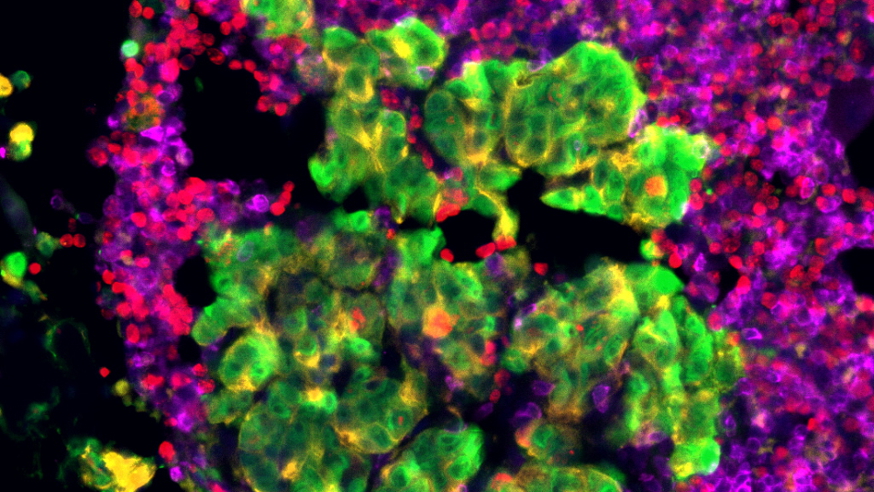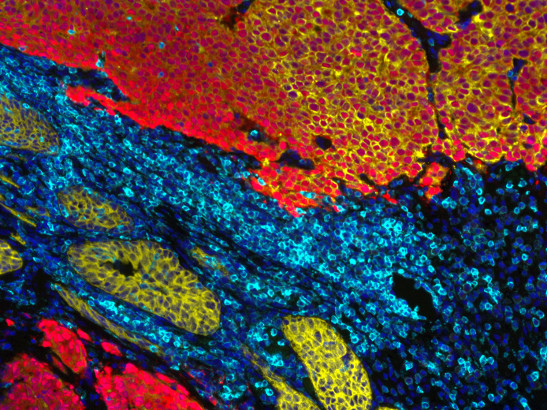
Prostate cancer cells. Credit: Mateus Crespo, Ana Ferreira, Daniel Nava Rodrigues and Johann de Bono
Scientists have identified 80 molecular weaknesses in prostate cancer that could be targeted by drugs – in the largest, most comprehensive study ever conducted into the genes that drive the disease.
Around a quarter of the gene mutations identified involve the targets of existing drugs that are either licensed or in clinical trials – suggesting that these could offer promise for further study as new approaches to treatment.
And the landmark research also opened up 60 new potential lines of attack against prostate cancer for future investigation, as well as identifying many new genes associated with the development of the disease.
An international team led by scientists at The Institute of Cancer Research, London, used Big Data techniques to analyse the tumour genetics of nearly a thousand patients with prostate cancer alongside a wealth of drug data.
The study is published in the journal Nature Genetics today (Monday), and was largely funded by Cancer Research UK.
Possible drug targets
The researchers obtained genetic information from the tumours of 112 men with prostate cancer and pooled it with data from other studies, together analysing samples from 930 prostate cancer patients.
They combined detailed genetic analysis with the latest Big Data approaches to identify large numbers of genetic changes that underlie the development and spread of prostate cancer. They then took this genetic information and drew up a map of the network of associated proteins.
Using canSAR, a comprehensive database for cancer drug discovery, they found that 80 of the proteins in the network were possible drug targets.
Some 11 of these were targeted by existing licensed drugs and seven by drugs in clinical trials, while 62 were identified as potential targets to explore.
Timeline of genetic changes
While further research is needed before the potential new targets could be explored in clinical trials, the new study has opened up many potential ways of targeting the disease.
For example, the research raised the possibility that BRAF and ATM proteins could be targeted in prostate cancer – and research is already under way in these areas.
The team also established a timeline of genetic changes in prostate cancer, which could in future improve ways to spot the disease – as current methods of diagnosis, such as PSA testing, are unreliable.
The timeline could also help predict the way prostate cancer evolves in individual patients, which might allow treatment to be adapted to combat drug resistance.
Researchers at the ICR are known around the world for their success in improving treatments for men with prostate cancer. Find out more about some of our more recent discoveries and our world-leading prostate cancer research.
Cutting-edge techniques
Study leader Professor Ros Eeles, Professor of Oncogenetics at the ICR, said:
“Our study applied cutting-edge techniques in Big Data analysis to unlock a wealth of new information about prostate cancer and possible ways to combat the disease.
“One of the challenges we face in cancer research is the complexity of the disease and the sheer number of ways we could potentially treat it – but our study will help focus our efforts on the areas that offer most promise for patient benefit.”
Study co-author Professor Paul Workman, Chief Executive of the ICR, said:
“This study has uncovered a remarkably large number of new genes that drive the development of prostate cancer, and given us vital information about how to exploit the biology of the disease to find potential new treatments.
“We hope our findings will stimulate a wave of new research into the genetic changes and potential drug targets we have identified, with the aim that patients should benefit as soon as possible.”
Dr Justine Alford from Cancer Research UK, said:
“A major hurdle to making further progress against prostate cancer is the lack of ways to accurately predict how a person’s disease will progress, making it challenging to know which treatment is best for each patient.
“By greatly enhancing our understanding of the genetics behind the disease, this research edges us closer towards that goal. If confirmed by further research, in the future this knowledge could help doctors better tailor treatments to an individual’s cancer, and hopefully see more people survive their disease.”
